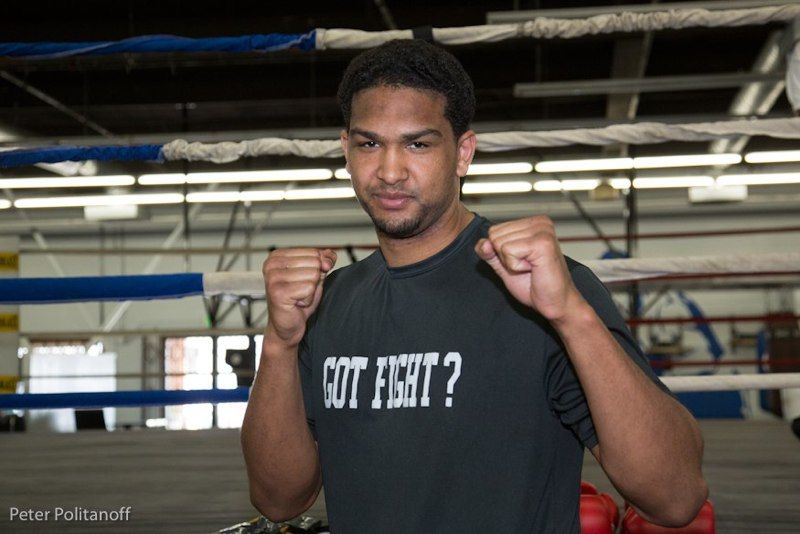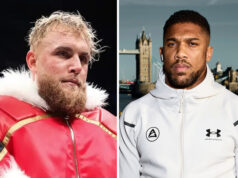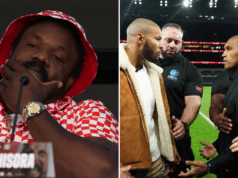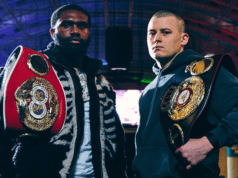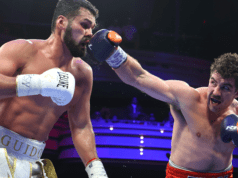Team USA Boxer Dominic Breazeale
Say hello to Dominic Breazeale. Over the coming weeks, months – and hopefully years – you’ll be seeing quite a bit of him. He qualified for the USA boxing team at the 2012 London Olympics with a strong outing at the American qualifying event in Rio de Janeiro, doing his part to give the US squad a strong, nearly full nine member team.
At 6’7″ and 255 lbs, he’s a formidable physical and athletic force. What’s amazing is that at 26 years old, now married and with two children, he only recently took up the sport of boxing, literally lacing up the gloves for the first time only after finishing his NCAA football career at Northern Colorado, where he was a quarterback.
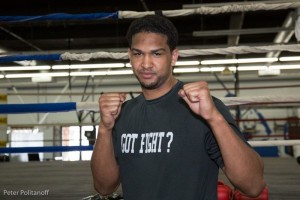 Recruited to the All American Heavyweights training academy after his NFL dreams went to the wayside, it took him three years to become a US National Champion, and then take home a silver medal in his first international competition. London 2012 is next, and his goal is the gold.
Recruited to the All American Heavyweights training academy after his NFL dreams went to the wayside, it took him three years to become a US National Champion, and then take home a silver medal in his first international competition. London 2012 is next, and his goal is the gold.
Here’s what Dominic “Trouble” Breazeale had to say in a special interview with ProBoxing-Fans.com about his journey to get here, what’s coming up next for him, and what his plans are for the London Olympics and beyond. Take a look.
You’re a few weeks removed from your Olympic qualifying run at the tournament in Rio. Describe that experience and what it was like for you.
Dominic Breazeale: It was my first international tournament, and going into it, it was nerve-wracking for sure. I know I wanted to go down and qualify for the Olympics, and I had some pretty tough competitors the first couple of days. I fought the Venezuelan former Olympian (Jose Payares), then the Brazilian (Gidelson Silva de Oliveira) in his backyard, then the Puerto Rican (Gerardo Bisbal), the Central American champion, so a lot of champions, and it was nerve-wracking. But I had a goal in hand and I wanted to reach it, and I did pretty well.
Were you expecting to do as well as you did and gain an Olympic berth – or did you surprise yourself?
DB: I definitely wasn’t expecting it at all, fighting for the first time internationally against some of the best athletes in the division. Of course it was a goal, and I was happy to accomplish that goal and do as well as it did.
You went 3-1 in your first international competition, and took home a silver for your efforts. How much confidence does that give you heading to London?
DB: Oh, so much confidence. I’ve only been boxing for three years, and some of these guys have been boxing for 14, 15 years, so to be able to beat somebody with that much experience gives me a whole world of confidence.
There’s a couple of months between now and the London Olympics. What’s the game plan for that time, and what will you be focusing on?
DB: We’re going to go back to the basics here. You can’t forget the jab, the 1-2, the high guard, things like that. I look forward to going back to the basics, moving around the ring and things like that. There’s stuff that I do in competition that I don’t work on in the gym, because I know it’s there.
Your family has a background in boxing, and after college your NFL dreams weren’t coming to fruition. But why else did you decide to pick up the Sweet Science at such a late age?
DB: All American Heavyweights made me an offer, an opportunity I couldn’t really refuse, to come out and learn the sport. I always had a competitive edge, playing football growing up, and then college football. I never thought I would do any boxing, I never even stepped into a boxing gym before. I didn’t know anything about boxing besides the pay-per-view events mom and dad would have in the house.
So when I got that call a couple of years ago at the age of 23, I kind of said why not, let me try it. I learned a basic 1-2, and was able to put guys down with just that, and I thought hey, if I could do that, I could do anything. I fell in love with the game of boxing. Of course, it helped out that my father and uncle were California Golden Gloves champs, and I always remember them bragging about that and their involvement with boxing too. Once I got started it was just like why not go for more, and that’s brought me all the way here.
Your favorite boxer is Riddick Bowe. What do you see in him that you see in yourself, or would like to imitate?
DB: Riddick Bowe always had a nice, strong jab. He didn’t really pop it as much as he should have, but when he did and it landed, it was powerful almost like a right hand. Being a big man like he is, he had a great inside game and loved to go to the body, my uppercuts are great and vicious, and I watch videos of him almost daily, to see how he carried himself into the ring, in the gym and all that good stuff, watching his fights against Evander Holyfield and everything else. Every time I watch Riddick Bowe in the ring, I learn something new.
What’s it like working with the All American Heavyweights team?
DB: All American Heavyweights is great. We have a gym here that’s state of the art, everything we could ask for. If there’s anything we need, we can ask for it and eventually it’s there in the gym. We’ve got great personnel, personal conditioning coaches, you have all of the equipment, cardio, weights, machines… you name it. It’s like a Division I program on steroids. The biggest thing for me as a quarterback is I’m a video guy, and they have an archive of videos I can get into daily, and coming from college football that’s been a big key for me. I’m able to watch my opponents and learn about what they do or what old fights to learn from them. They have everything you can ask for.
What kind of advantage do you think all of that gives you, not only internationally but domestically against other boxers here?
DB: As a boxer, it helps to make me complete, and gives me a whole new sense of confidence going into the ring. I’m definitely prepared for anything in the ring or out of the ring. I’m confident in my boxing skills, my trainer in the corner, the strength and conditioning… I’m in the best shape I possibly can be. I know if I have to dig down deep in the third round, I definitely have it there in the gas tank. All of the components they have provided are absolutely phenomenal.
In 2008, the only American boxer who won a medal was Deontay Wilder, a heavyweight who took up boxing late after largely focusing on basketball. How familiar are you with that story, and is that something you look to for inspiration considering your similar circumstances?
DB: I don’t know the whole, complete story, but I’ve heard things about it, and it’s definitely similar to me and my situation. It’s always good to hear things like that, and to see how he was so young in his career and he was able to go to the Olympics, and medal, gives me the knowledge and confidence that I can do the same thing.
What’s your goal for London?
DB: Gold! Gold is the goal. I’m not going there to get a bronze medal and say I pulled it off. I’m going to London prepared to get the gold medal.
Are there any particular fighters in your division that you’re wary of, or paying attention to? Or are you just more focused on yourself and your own performance?
DB: Absolutely, I’m looking forward to the draw and whoever is lined up is lined up. The competition should all be worried about me, Dominic Breazeale.
Looking ahead even further if you can, what are your professional boxing aspirations?
DB: Well you know the goal is all about the Olympics right now and after we accomplish that we’ll draw up a road map for the future and get to the top, and eventually compete for the heavyweight title.
What can fans expect to see from you at the Olympics? If you were trying to convince somebody to watch you on television at the Olympics, what would you tell them?
DB: If you want to see an explosive, dynamic fighter, then definitely tune in. I never let the fans down. A lot of the guys on our team down in Rio they were calling me pay-per-view, because every time I step in the ring, I put on a show.


